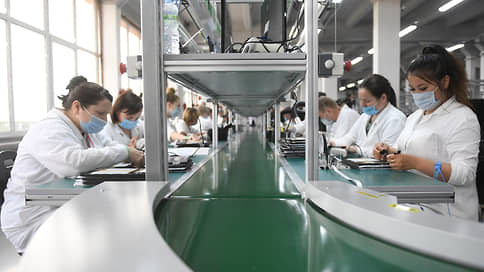Yadro is going to release smartphones under the Kvadra brand
[ad_1]

Yadro plans to develop and release a smartphone under the Kvadra brand, Kommersant learned. Production could start in Dubna at the end of 2024. The company plans, among other things, to launch the production of printed circuit boards for smartphones, and in the future, switch to using its own processor on the open RISC-V architecture. Kommersant’s interlocutors say that Yadro will be able to master the production of printed circuit boards for smartphones, but this will require unique specialists who can supply and configure equipment.
According to Kommersant’s interlocutor in the electronics market, the Yadro group (part of ICS-Holding) plans to follow the tablets it produces under the Kvadra brand to bring its own smartphones to the Russian market. Kommersant’s source believes that Yadro will not follow the path of SKD assembly from Chinese components, but will organize production, including using Russian printed circuit boards. The release of devices, according to him, may begin at the end of 2024. This information is confirmed by Kommersant’s sources in the company and in the IT market: “Even during the development and preparation for the release of the tablet, it was assumed that the next step would be a smartphone. Yadro expected it to run on its own RISC-V processor in the future.”
On HH.ru, Kommersant discovered that Yadro had posted a vacancy for Product Owner, who will develop a product positioning strategy, create a roadmap for bringing them to the market, etc. The job description does not indicate that we are talking about smartphones , but a prerequisite is work as a Product Manager for at least three years in the direction of developing PCs, tablets, laptops, mobile devices or other high-tech software and hardware systems. Yadro declined to comment.
Now Yadro produces client devices under the Kvadra brand (Kernel Client Systems LLC). The line includes a monoblock, a laptop and a PC. At the end of May, the company introduced the Kvadra_T tablet on Kvadra OS (developed on the basis of the Android Open Source Project AOSP). The current version of the tablet runs on an ARM processor, in the future the company plans to release them on RISC-V chips, RBC wrote.
Yadro has the technical ability to start developing and releasing its own smartphones, said Dmitry Altukhov, Advisor to the Director of the Internet Initiatives Development Fund (IIDF). In his opinion, the company can produce smartphones both independently and use the ODM (original design manufacturer) production of GS Group (at the end of June, the company announced that it was expanding ODM production and launching the development of smartphones and computer technology). But even in this case, Mr. Altukhov says, the price of the end device will be higher than Chinese counterparts.
In the stated time period, it is “at least extremely difficult” to create a smartphone from Russian components, says Kommersant’s interlocutor in the electronics market: “It is possible to start production of our own cases, albeit not from polycarbonate, which is now widely used in the industry, but from metal.” The rest of the components are not yet produced in Russia at all: neither the main chipsets, nor the LCD matrices, nor the flexible cable, nor the camera matrices, even batteries are not yet a mass story. The Kommersant source adds that if Yadro invests in the production of fiberglass, then in two or three years it will be able to produce sufficiently complex boards to produce smartphones.
However, Yadro may encounter problems with importing to Russia and debugging equipment for the production of printed circuit boards for its smartphones, Ivan Pokrovsky, executive director of ARPE, believes: “Equipment for the production of printed circuit boards from the third to the fifth grade – they are used, for example, for the production of automotive electronics – you can import. From the fifth to the seventh grade – this is already the level of computer technology, the seventh grade and above – boards for smartphones. He adds that it is possible to import equipment of the fifth or seventh grade and above “with due diligence”, but the issue is in launching and debugging.
Director General of the Consortium of Printed Circuit Board Manufacturers (ANO KPP) Vladimir Semenov objects that there will be enough printed circuit boards of the sixth and sixth-plus classes for smartphones. At the same time, he agrees that the main difficulty will be created by debugging production: “Specialists of a very narrow profile are engaged in this. They are accustomed to working on European equipment, which is practically not imported into Russia, only starting to master Chinese counterparts.”
[ad_2]
Source link





